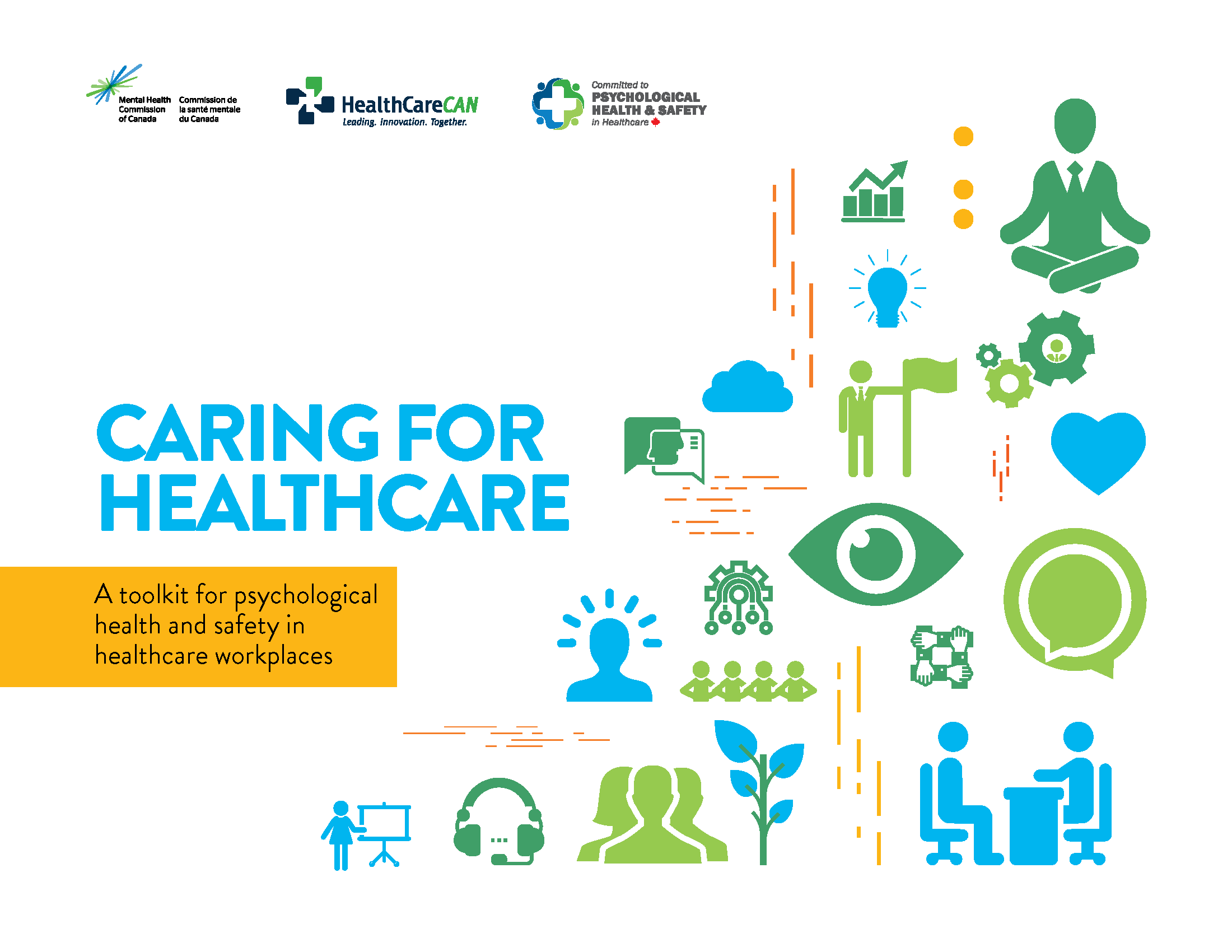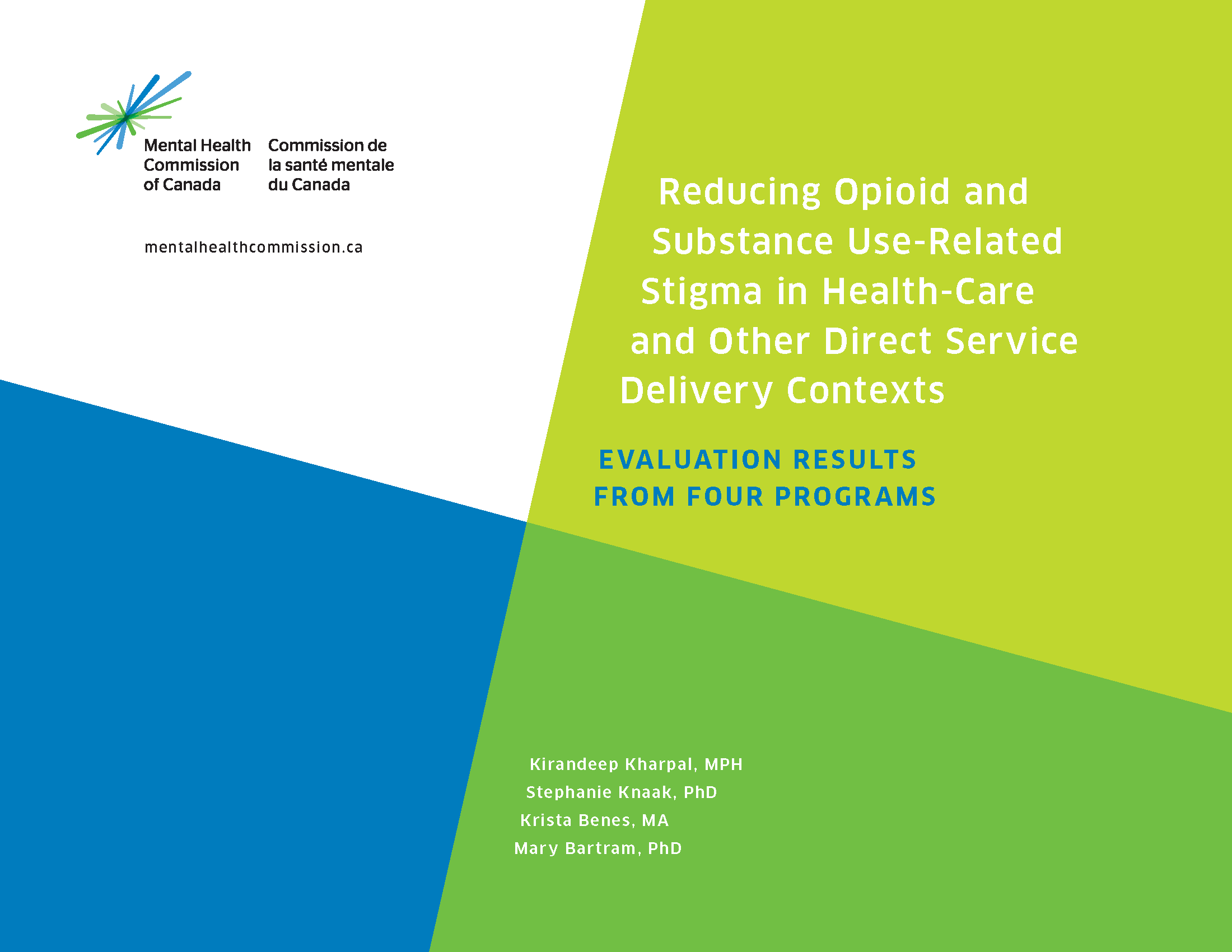If you are in distress, you can call or text 988 at any time. If it is an emergency, call 9-1-1 or go to your local emergency department.
- Professional Resources, Toolkits
Caring for Healthcare – A toolkit for psychological health and safety in healthcare workplaces
The National Standard of Canada for Psychological Health and Safety in the Workplace (the Standard) gives organizations in all sectors a framework for promoting mental health and preventing psychological harm at work. This toolkit was created specifically for the healthcare sector to provide ideas and resources for implementing the Standard in what can often be a challenging and complex environment. Yet with the pressures of a rapidly evolving healthcare system, radical advances in technology, shifting patient expectations and on-the-job risks of psychological harm and physical violence, the needs of healthcare staff and practitioners can be acute. Meeting them effectively has a direct impact on the quality of care delivered to patients — making workplace mental health a priority. Because every organization is different, and because psychological health and safety can touch on virtually every aspect of the healthcare workplace, there is no single “best practice” way of implementing the Standard. There are, however, lessons to be learned and insights available from looking at the experience of other organizations progressing along the implementation journey. This toolkit tells the real-world stories of 4 such organizations: the Ontario Shores Centre for Mental Health Sciences, Alberta Health Services, Nova Scotia Health Authority, and the Michael Garron Hospital. Each took part in the 3-year national Case Study Research Project spearheaded by the MHCC in 2013 and is an active member of the By Health, For Health Collaborative. All 4 organizations are also signatories to the Declaration of Commitment to Psychological Health and Safety in Healthcare aligned with the Standard and are true champions in this area.ABOUT THIS TOOLKIT
Healthcare organizations are built to care for others. In providing that care, practitioners often overlook or deny their own needs, especially when it comes to their physical, mental, and emotional wellbeing.LEARNING FROM EXPERIENCE
- Professional Resources, Toolkits
Caring for Healthcare – A toolkit for psychological health and safety in healthcare workplaces
Caring for Healthcare – A toolkit for psychological health and safety in healthcare workplaces
- Health-care, Health-care Providers, National Standard for Psychological Health and Safety in the Workplace, Workplace Mental Health
The National Standard of Canada for Psychological Health and Safety in the Workplace (the Standard) gives organizations in all sectors a framework for promoting mental health and preventing psychological harm at work. This toolkit was created specifically for the healthcare sector to provide ideas and resources for implementing the Standard in what can often be a challenging and complex environment. Yet with the pressures of a rapidly evolving healthcare system, radical advances in technology, shifting patient expectations and on-the-job risks of psychological harm and physical violence, the needs of healthcare staff and practitioners can be acute. Meeting them effectively has a direct impact on the quality of care delivered to patients — making workplace mental health a priority. Because every organization is different, and because psychological health and safety can touch on virtually every aspect of the healthcare workplace, there is no single “best practice” way of implementing the Standard. There are, however, lessons to be learned and insights available from looking at the experience of other organizations progressing along the implementation journey. This toolkit tells the real-world stories of 4 such organizations: the Ontario Shores Centre for Mental Health Sciences, Alberta Health Services, Nova Scotia Health Authority, and the Michael Garron Hospital. Each took part in the 3-year national Case Study Research Project spearheaded by the MHCC in 2013 and is an active member of the By Health, For Health Collaborative. All 4 organizations are also signatories to the Declaration of Commitment to Psychological Health and Safety in Healthcare aligned with the Standard and are true champions in this area.
ABOUT THIS TOOLKIT
Healthcare organizations are built to care for others. In providing that care, practitioners often overlook or deny their own needs, especially when it comes to their physical, mental, and emotional wellbeing.LEARNING FROM EXPERIENCE
SHARE THIS PAGE
RELATED

Review our Assessment Framework for Mental Health Apps — a national framework containing key standards for safe, quality, and effective mental health apps in Canada.

To help expand the use of e-mental health services, we developed four online learning modules based on our Toolkit for E-Mental Health Implementation, in collaboration with the Centre for Addiction and Mental Health (CAMH).

Stepped Care 2.0© (SC2.0) is a transformative model for organizing and delivering evidence-informed mental health and substance use services.

